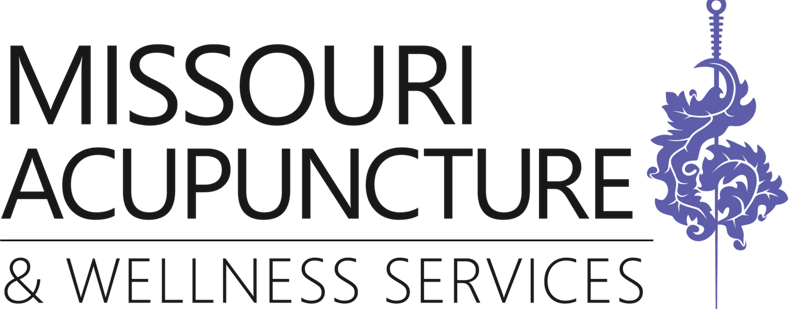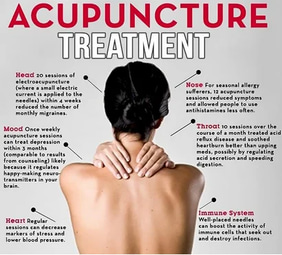Acupuncture Treatment in Our Clinic
Acupuncture and Herbal Medicine can be used to treat a variety of different ailments. Below is a list of the most common patient complaints which, according to the World Health Organization, acupuncture may effectively treat.
Chronic and Acute symptoms which acupuncture may effectively treat are:
Injuries
Low back pain
Arthritis, osteoarthritis
Muscle sprains and strains
Back pain
Neck pain
Shoulder pain
Foot pain
Hip pain
Knee pain
Numbness
Tingling in the arms or hands
Tendinitis
Carpal tunnel syndrome
Headache & Fertility
Auto-immune System Diseases:
Recurrent infections
Supportive treatment for cancer patients
Support treatment for AIDS patients
Fibromyalgia
Multiple sclerosis
Muscular and Nervous System Disorders: acupuncture treatment in our clinic
Migraine headaches
Regular headaches
Tension
Fatigue
Body pains
Certain facial paralysis or nerve pain
Inflammation of joints and nerve endings
Migraine headaches
Regular headaches
Tension
Fatigue
Body pains
Certain facial paralysis or nerve pain
Inflammation of joints and nerve endings
Disorders of the Ear, Nose and Throat:
Toothaches
Pain after having a tooth pulled
Dizziness
Earaches
Sinus inflammation
Nasal inflammation
Dryness in the ear
Nose or throat area
Tinnitus (ringing in the ears)
Meniere’s disease
Respiratory Disorders:
Uncomplicated cases of bronchial asthma in children and adults
Allergies
Bronchitis
Sinusitis
Sore throat
Laryngitis
Colds and flu
Gastrointestinal Disorders:
Digestive tract problems
Colitis (inflammation of the colon)
Constipation
Diarrhea
Heartburn
Acid reflux
Irritable bowel syndrome
Gastritis
Food allergies
Ulcers
Gynecological Disorders:
PMS
Abdominal cramps
Irritability
Food cravings
Menopause (Menopausal symptoms)
Effective of treatment of mild to moderate endometriosis
Irregular menstrual flow
Cystitis
Irregular or heavy periods
Urinary disorders
Infertility Support
Emotional Disorders:
Depression
Anxiety
Stress
Weight loss
Insomnia
Nervousness
Fertility
Improve ovulation
Improve the outcomes IVF as well as Embryo Transfer
Male infertility
Labor induction
Nausea associated with pregnancy
Low back pain associated with pregnancy
Urinary incontinence associated with pregnancy
Join our growing list of proud parents!
This is only a partial list of ailments which we treat. A more comprehensive list of treatable ailment can be found in our F.A.Q. page under the question “What does acupuncture treat?”.
If your particular ailment is not listed, please contact us for more information.
Acupuncture, rooted in traditional Chinese medicine (TCM), is a therapeutic technique that involves inserting thin needles into specific points on the body. These points are believed to be pathways for the flow of vital energy, or Qi, within the body. By stimulating these points, acupuncture aims to restore balance and promote natural healing processes.
One of the key principles of acupuncture is the concept of yin and yang, representing opposing forces that need to be in balance for optimal health. When yin and yang are out of balance, illness or discomfort may occur. Acupuncture seeks to rebalance these forces by targeting specific points along meridians, or energy channels, in the body.
Acupuncture has been used for thousands of years to treat a wide range of conditions, including chronic pain, musculoskeletal disorders, digestive issues, anxiety, depression, and more. While its effectiveness is still a subject of ongoing research and debate, many people report significant relief from their symptoms after undergoing acupuncture treatments.
During an acupuncture session, the practitioner will first conduct a thorough assessment of the patient's health history and current symptoms. Based on this information, they will determine which acupuncture points to target and develop a treatment plan tailored to the individual's needs.
The insertion of acupuncture needles is typically painless, though some people may experience a slight tingling sensation or dull ache at the insertion site. Once the needles are in place, they may be gently manipulated to further stimulate the acupuncture points. The needles are usually left in place for around 20-30 minutes while the patient relaxes.
In addition to traditional acupuncture, which focuses on the insertion of needles, there are other variations of the practice, such as acupressure, where pressure is applied to acupuncture points instead of needles, and electroacupuncture, which involves the use of electrical stimulation to enhance the effects of acupuncture.
Many people find acupuncture to be a safe and effective complement to conventional medical treatments, particularly for managing chronic pain and other conditions that may not respond well to medication alone. However, it's essential to seek treatment from a qualified and experienced acupuncturist to ensure safety and efficacy.
Overall, acupuncture offers a holistic approach to health and wellness, addressing not only the symptoms but also the underlying imbalances that contribute to illness or discomfort. As research into acupuncture continues to evolve, its potential benefits for various health conditions are becoming increasingly recognized and integrated into mainstream healthcare practices.


